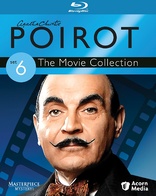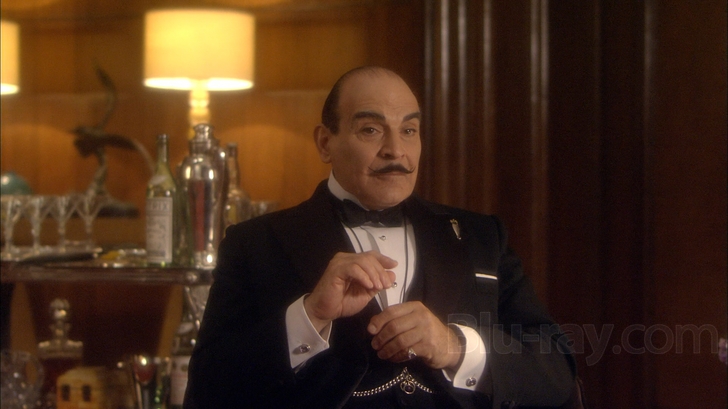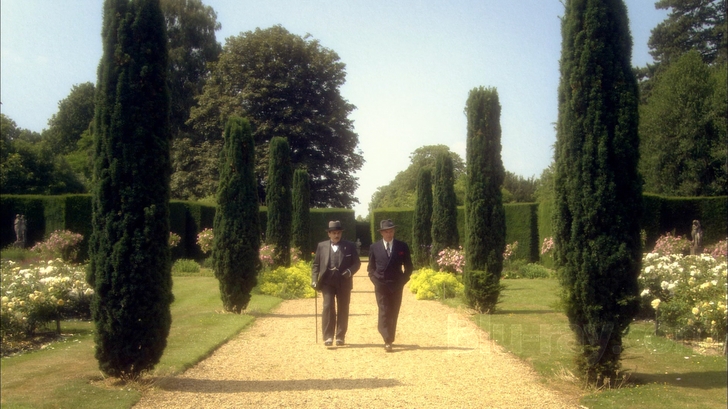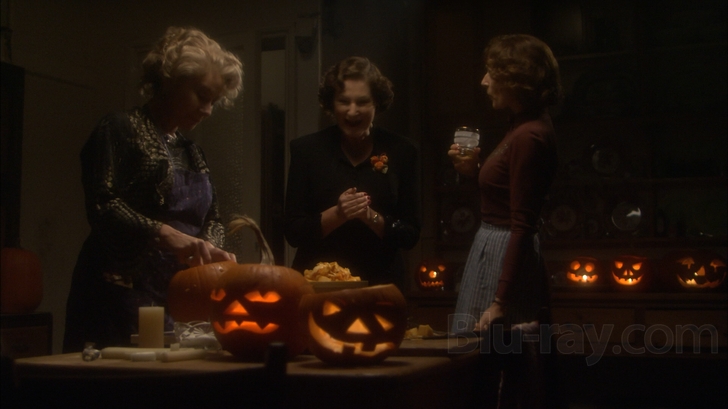Poirot: The Movie Collection - Set 6 Blu-ray Movie
HomePoirot: The Movie Collection - Set 6 Blu-ray Movie 
Acorn Media | 2009-2010 | 278 min | Not rated | Jul 12, 2011
Movie rating
8.3 | / 10 |
Blu-ray rating
| Users | 0.0 | |
| Reviewer | 3.5 | |
| Overall | 3.5 |
Overview
Poirot: The Movie Collection - Set 6 (2009-2010)
Contains the films: The Clocks, Three Act Tragedy and Hallowe'en Party. Together with Murder on the Orient Express (sold separately), these constitute Series 12 of Poirot.
Starring: David Suchet, Hugh Fraser (I), Philip Jackson (II), Pauline Moran, David YellandDirector: Edward Bennett (I), Andrew Grieve, Renny Rye, Brian Farnham
| Period | Uncertain |
| Mystery | Uncertain |
| Crime | Uncertain |
| Drama | Uncertain |
| Thriller | Uncertain |
Specifications
Video
Video codec: MPEG-4 AVC
Video resolution: 1080p
Aspect ratio: 1.78:1
Original aspect ratio: 1.78:1, 1.33:1
Audio
English: LPCM 2.0
Subtitles
English
Discs
25GB Blu-ray Disc
Three-disc set (3 BDs)
Packaging
Slipcover in original pressing
Playback
Region A (locked)
Review
Rating summary
| Movie | 3.5 | |
| Video | 3.5 | |
| Audio | 3.5 | |
| Extras | 0.0 | |
| Overall | 3.5 |
Poirot: The Movie Collection - Set 6 Blu-ray Movie Review
Murder most foul.
Reviewed by Casey Broadwater July 13, 2011Grand dame of British crime literature, master of the whodunit, and—according to the Guinness Book of World Records—the best-selling novelist of all time, Agatha Christie has quite a legacy. Along with the elderly spinster and amateur gumshoe Miss Jane Marple, Christie’s most enduring creation is the character of Hercule Poirot, a Belgian detective and kind of latter-day Sherlock Holmes who appears in some 33 novels and several volumes of short stories. Since 1989, the British series Agatha Christie’s Poirot has been adapting these tight-knit tales for the small screen, and the show— which stars David Suchet, widely considered the definitive Poirot—has just about exhausted Christie’s original source material. Only a few of the novels have yet to get the made-for-TV-movie treatment, and once those have been filmed—and it looks like they will be—well, “that’s all she wrote.” So, naturally, Poirot fans have been anxiously awaiting each new entry in the series, hoping the remaining movies capture the Swiss clockwork-like precision and psychological depth of Christie’s deft murder mysteries. Late last year, the series made its first foray onto Blu-ray with Murder on the Orient Express, and Acorn Media is back with a three-disc set containing Three Act Tragedy, The Clocks, and Hallowe’en Party, all of which recently aired in the U.S. on PBS’s Masterpiece Mystery! program.

Hercule Poirot
The rather non-descript title Three Act Tragedy could apply to any number of Christie’s novels, but it’s taken literally—that is, theatrically— here, as the key figure around which the mystery revolves is retired stage star Sir Charles Cartwright (Martin Shaw), one of Poirot’s old friends. When the story opens, Sir Charles has invited Poirot for a cocktail party, and we’re quickly introduced to the other attendees, essentially the “players” in this production. There’s flat-racing fanatic Captain Dacre and his dressmaker wife Cynthia, Lady Mary and her daughter Miss Lynette— who are “long on breeding, short on cash”—and androgynous up-and-coming playwright Anthony Astor. We also have the puttering parson, Mrs. Babbington, psychologist Bartholomew Strange (Art Malik), and two young performers, left-wing ideologue Oliver and the oddly-named buxom blond Egg (Kimberly Nixon), who has recently caught Sir Charles’ eye. The festivities are cut dreadfully short when the parson keels over after taking a swig of his drink. Who would benefit from the death of an innocent old pastor? The answer isn’t clear and when another death occurs later at a different party with a nearly identical guest list, Poirot—with help from Sir Charles—is hard pressed to find an explicit link between the two murders. Poirot always gets his man (or woman) though, and after ferreting out the clever misdirection of the killer—a process involving many interviews and much deductive reasoning—he spells out the intricacies of the crime with his characteristically flawless logic.
This is basically how all of these stories end. Poirot gathers the suspects in a single room and delivers a lengthy monologue explaining each character’s motivations, alibis, and cover-ups, ending with a fiery, shameful condemnation of the killer. If you like a bit of ambiguity in your mystery movies, Agatha Christie’s Poirot probably won’t be your particular cup of tea. If, however, you’re looking for intricate plotting, sudden “a-ha” moments, and a whodunit guessing game that will keep you stroking your chin and scratching your head like some mad ape until the final scenes, you’ve come to the right place.
The second film in the set, The Clocks, is even more complicated than the first, to the extent that it sometimes feels needlessly convoluted, with a knotted plot that becomes increasingly hard to follow as it tightens. All is eventually revealed—as is always the case with Poirot—but this one doesn’t exactly solve itself. A nice touch is the opening, which finds our penguin-like detective at the theatre, where he practically rolls his eyes at a murder mystery play called “The Good Samaritan” which so bores the master intellect that he opts to leave after intermission. In the lobby of the playhouse he’s approached by MI6 secret agent Colin Race (Tom Burke), a family friend who’s been assigned to hunt down a German spy ring operating out of Dover. (Although Christie’s novel was set during the 1960s, it’s been re-imagined in the 1930s here for the sake of style and continuity with the other recent episodes of the TV series.) Colin is seeking Poirot’s help in solving the perplexing case of a dead man, surrounded by four stopped clocks, found in the home of Miss Pebmarsh (the wonderful Anna Massey), an old blind woman who claims she has no idea who the man might be or how he got there. Adding to the oddity, the body was discovered by Sheila (Jaime Winstone), a rent-by-the-hour typist who was seemingly sent to Miss Pebmarsh’s home by mistake. (Did I mention that Colin has fallen in love with Sheila after literally running into her as she was fleeing the house in horror?) The suspects include several colorful neighbors—look out for the crazy, enthusiastic cat lady—but as Poirot cuts through the elaborate web of interconnections, he eventually arrives at a comparatively simple solution. They probably could’ve called this one “The Red Herring.”
If The Clocks is something of the letdown, the set redeems itself with the final film, Hallowe’en Party, a spooky chiller that’s dripping with late-October atmosphere. At the titular party, thrown by prim hostess Rowena Drake, a young girl named Joyce—who’s dressed up like the bee girl from Blind Melon’s “No Rain” single—is found drowned in an apple-bobbing tub. Earlier in the evening, she had tried to convince all the partygoers that she had once witnessed a murder, and that she had only recently realized what she’d seen. No one believes her except—obviously— whoever decided to permanently silence her to keep the truth from coming out. Poirot is called in to Woodleigh Common by his mystery writer friend Ariadne Oliver (Zoë Wanamaker), and although all the adults who attended the party continue to be dismissive of Joyce’s claims, the famed detective turns up plenty of dirt when he begins going through the hardheaded local police chief’s unsolved mystery files, discovering three murders that could’ve possibly been the one Joyce witnessed. When a second child is found drowned, Poirot realizes he must find the culprit quickly before he—or she—strikes again. Could it be the kooky elderly charwoman, Mrs. Goodbody? The rather Byronic gardener, Michael Garfield (Julian Rhind-Tutt)? The testy Rowena Drake? The Reverend Cotrell, who seems to be involved in the underground import of Russian peasant women? Follow the clues carefully and you might crack the case before Poirot, but I wouldn’t bet on it.
“Made-for-TV-movie” usually has negative connotations in the U.S.—shoddy acting, poor production values, bland cinematography—but while you’d never mistake the 90-minute Poirot films for proper theatrical presentations, they’ve got strong supporting actors, great period sets and costuming, and a style entirely their own. The late 1930s pre-war setting is especially evocative. Of course, David Suchet is the real reason to watch. Other actors have tackled the Poirot role in films and on television—Albert Finney, Ian Holm, Alfred Molina—but none have embodied the character as fully as Suchet, from his waddle-like walk to the fastidiousness with which he takes in a crime scene. He’s almost always reserved and observant, and this makes the few moments when he actually breaks into rage truly effective. And, come on—you’ve got to love that impeccably groomed mustache.
Poirot: The Movie Collection - Set 6 Blu-ray Movie, Video Quality 

The Poirot series used to be shot on 16mm, but the recent widescreen films appear to be all-digital productions. While there's definitely a "made for TV" quality to the 1080p/AVC encodes, the picture is satisfying—if never exactly wowing—and I'm confident each film looks better here than it did in its original television broadcast. Most of the issues at hand are source related. Compression and video noise spike a bit during darker scenes, black levels are never quite as deep as they could be, and the image has a kind of hazy glow, most likely the product of shooting through a softening diffusion filter. Clarity, then, is inconsistent. Close-ups reveal fine facial detail and even the texture of Poirot's felt hat, but wider shots have a tendency to appear less resolved. Still, the films easily best their standard definition counterparts. Color is as dense as it needs to be, with fairly vibrant reds and greens, and skin tones are balanced. There's some slight color clipping in the highlights on occasion, but no major problems like banding. You probably won't reach for Poirot when showing off your home theater setup, but taken on their own merits, the three films in this set look just fine.
Poirot: The Movie Collection - Set 6 Blu-ray Movie, Audio Quality 

Each film in the set comes with an uncompressed Linear PCM 2.0 stereo track. A full 5.1 presentation could've definitely added to the atmosphere, especially in Hallowe'en Party, but there's really nothing wrong with these two-channel mixes. The Poirot series could be listed next to a definition of "dialogue driven," so other than the possibility of some creepy immersive ambience—wind and thunder, eerie chanting children—you're not missing much here. Voices are always clean and easily understood, with no crackling, hisses, or pops. What few effects there are have presence, even if they are understated, and Christian Henson's music fills out the otherwise spartan soundspace nicely. Optional English subtitles are available for those who need or want them.
Poirot: The Movie Collection - Set 6 Blu-ray Movie, Special Features and Extras 

Unfortunately, there are no supplementary materials whatsoever included in this set.
Poirot: The Movie Collection - Set 6 Blu-ray Movie, Overall Score and Recommendation 

The Poirot series is adamantly old-fashioned and a bit stuffy, but for by-the-numbers murder mysteries, you really won't find much better. While longtime fans will definitely want to add this three-film set to their collections, newcomers might want to look into the single-disc release of The Murder on the Orient Express, which is perhaps a better introduction to the series. Here's to hoping David Suchet and the show's producers get the greenlight to adapt the final few Poirot novels! Recommended for whodunit solvers, armchair detectives, deductive reasoners, and the left- brained in general.
Other editions
Poirot: Other Seasons

Poirot: Series 1
1989

Poirot: Series 2
1990

Poirot: Series 3
1991

Poirot: Series 4
1992

Poirot: Series 5
1993

Poirot: Series 6
1995-1996

Poirot: Series 7 & 8
2000-2001

Poirot: Series 9
2003-2004

Agatha Christie's Death on the Nile
2004

Poirot: Series 10
2006

Poirot: Series 11
2008-2009

Poirot: Murder on the Orient Express
2010

Poirot: Series 12
2010-2011

Poirot: Series 13
2013
Similar titles
Similar titles you might also like
(Still not reliable for this title)

The Mirror Crack'd
1980

State of Play
2009

Murdoch Mysteries: Season 18
The Artful Detective
2024-2025

Zodiac 4K
Theatrical 4K | Director's Cut BD only
2007

Foyle's War: Set 8
2014

The Night of the Generals
Limited Edition to 3000 - SOLD OUT
1967

Murder on the Orient Express 4K
50th Anniversary Edition
1974

Miss Marple: Volume 1
The Murder at the Vicarage / The Body in the Library / The Moving Finger / A Murder is Announced
1984-1986

The Raven
2012

Murder on the Orient Express
2017

Twisted
2004

The Black Dahlia
2006

Evil Under the Sun
1982

Gosford Park
Arrow Academy
2001

Crooked House
2017

The Girl with the Dragon Tattoo
2011

The Bone Collector 4K
1999

Murder by Decree 4K
1979

Taboo: Season One
2017

L.A. Confidential
1997